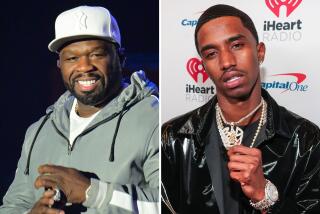King Launches Media Drive to Reshape Tarnished Image : Strategy: He defends himself as ‘decent’ on radio show. Some say aim may be to boost settlement from city.
- Share via
Saying he wants to show the public he is “a decent human being just like anyone else,” a nervous and somewhat awkward Rodney G. King launched a national campaign Saturday to remake his occasionally troubled image, appearing live on a Los Angeles radio call-in show after almost two years of being sheltered from the media.
Billed as the first broadcast interview with the former construction worker, King spent two hours on black-owned KJLH-FM telling listeners that he is not “a ruthless bear like the media portrayed me,” but a regular guy whose life has been turned upside-down since he was unwittingly thrust onto history’s stage by his videotaped police beating.
His attorney said King wanted only to give the public a glimpse of his “true image,” which was tainted by four later brushes with the law, none of which resulted in the filing of charges. Skeptics suggested that the strategy is designed to pressure city officials into awarding a more generous settlement in King’s civil rights lawsuit.
“This case is not a public relations campaign,” said Councilman Zev Yaroslavsky, who proposed the $1.75-million settlement that King rejected three months ago. “The city wants to make Mr. King whole and has offered to make him more than whole, but we are not going to set the Guinness Book world record on settlements just because it’s Rodney King.”
King’s radio interview marked his second public appearance since dropping Beverly Hills lawyer Steven A. Lerman, who maintains that his former client is shy, traumatized and not well-served by speaking openly about his life. Now under the tutelage of noted Orange County defense attorney Milton C. Grimes, King has charted a new course. Last month, he gave a surprise talk to an African-American student group at Tustin High School--angering some parents and district officials who said he was not an appropriate role model.
Saturday’s interview, during which King pledged to establish a youth scholarship and become involved in efforts to rebuild the city, was clearly geared to a more sympathetic audience. Most callers to KJLH--which stands for Kindness, Joy, Love and Happiness--were effusive in their praise for the 27-year-old King, hailing him as “an inspiration” and “a national hero.” Even the Rev. Jesse Jackson called in, saying that King’s pleas for harmony during the spring unrest saved many lives.
“I love you very much, buddy,” Jackson said.
“Me, too, reverend,” King replied.
Although he was on air for two hours, King revealed few new details about his case or life. Grimes frequently interjected to keep him from commenting on anything that he believed could affect the pending litigation. King spoke largely in generalities, denouncing racism and police brutality, while urging youths to stay in school and avoid some of the mistakes he made.
“I’m tired of people . . . judging me by some of my previous actions,” said King, who was most recently arrested in July on suspicion of drunk driving. “It’s kind of like someone saying: ‘Oh well, he took a whupping . . . but, OK, things are happening now that justify the whupping.’ ”
Because King was never called to testify against the four officers accused of beating him, his comments will likely be examined closely by attorneys involved in the federal civil rights trial of the officers. The Times last month disclosed that a confidential government memo questioning King’s credibility as a witness was leaked to a defense lawyer.
Lerman, who represented King for 1 1/2 years, said he tried to shield him from the media because he feared that King’s comments might be misinterpreted or taken out of context, undermining his believability.
“Anytime Mr. King comes across positively and can increase the amount of sympathy for him, it would benefit his case,” Lerman said in an interview. “But there’s more downside risk involved than there is upside gain. Rodney is basically a shy, soft-spoken individual who has suffered a great deal of mental and physical trauma.”
Grimes believes that King’s silence has led to a flawed perception of him as a “monster” who seems unable to stay away from trouble. He said the radio show is one of many appearances scheduled nationwide to give King a chance to let people know he is just a normal person.
“I think the public should know who Rodney King is and I think the public can better make a decision on that if they hear Mr. King instead of hearing about Mr. King,” said Grimes, who has earned a strong reputation for his innovative defenses in a series of high-profile Orange County murder cases. “We have nothing to hide.”
But after arriving at the KJLH offices on Crenshaw Boulevard shortly before the 9 a.m. air time, Grimes decided against allowing media inside the studio. A news conference planned for after the show was also canceled. King, dressed in a gray suit and tassel loafers, showed up in an Audi sedan with tinted windows and was whisked in and out of the station through a back door.
“There is an agenda, absolutely, no doubt about it,” radio host Jacquie Stephens said of King’s acceptance of the invitation to appear on her show. “But they’re not going to reveal their trump cards.”
Throughout the interview, King seemed ill at ease, speaking haltingly and sometimes appearing to lose his train of thought.
Without offering any explanation, he said he is uncomfortable eating in restaurants where he cannot see the chef preparing his food. As an example of the type of affronts he says he is subjected to, he mentioned a waitress who began sweeping a broom in front of his feet.
“I just kind of played it off and just looked at her and kept on walking, but those are the type of, uh, little . . . little get-backs they’ll have . . . in the way of getting back at me,” he said.
Describing the few occasions when he does venture into public, King said: “I go to a lot of black areas and I get a lot of kisses and hugs and warmth. As far as going to another community, it’s more like, uh, I was this problem, you know, like I was this problem, like I’m a problem, I’m a problem.”
King and Grimes have declined to discuss why he switched attorneys in October. Lerman, who was notified about the change in a phone call from Grimes, said he has been prevented by the new lawyer from contacting King.
The switch followed a tumultuous exchange between King’s former attorney and Los Angeles city officials as they tried to negotiate a settlement to his civil lawsuit. After months of discussion with representatives of the city attorney’s office, King had agreed to accept a $5.9-million settlement. But when the city attorney took the proposal to the City Council in September, council members balked.
Instead, they offered to award King a lump sum of $250,000 and establish an investment fund that would pay him $75,000 annually for the rest of his life. Should he die early, King’s heirs would be assured payment for 20 years, amounting to a guarantee of $1.75 million.
Lerman, who would have had to petition the court separately for attorney fees, felt betrayed and accused the council of toying with his client to appease conservative constituents who do not believe that King should receive money.
In October, King hired Grimes on a contingency basis. Deputy City Atty. Don Vincent, head of the police litigation unit, said he was puzzled that Grimes had not contacted the city in the two months he has had the case. Grimes, asked by a Times reporter why he has not reopened negotiations, said he did not want to discuss his legal tactics.
While on the air Saturday, Grimes said he and King met last week with the Rev. Cecil L. Murray, pastor of First African Methodist Episcopal Church, to discuss ways to help rebuild the community.
They also plan on contacting Rebuild L.A. Chairman Peter V. Ueberroth to lend King’s services. Later Saturday night, King was scheduled to attend a performance of “Windows: Mama, Why Is L.A. Burning?” a multicultural play about the riots.
More to Read
Sign up for Essential California
The most important California stories and recommendations in your inbox every morning.
You may occasionally receive promotional content from the Los Angeles Times.










